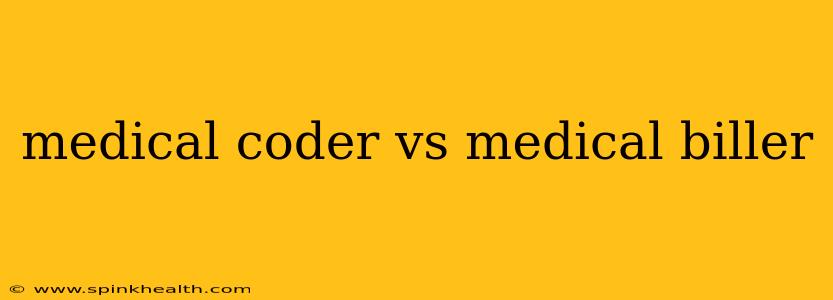Medical Coder vs. Medical Biller: Unveiling the Differences in These Crucial Healthcare Roles
The healthcare industry hums with activity, and behind the scenes, two critical roles ensure smooth operations: medical coders and medical billers. While both contribute to the financial health of medical practices, their tasks and skillsets differ significantly. Imagine them as two pieces of a perfectly functioning clock – both necessary, but with distinct responsibilities. Let's delve into the world of medical coding and billing to understand their unique contributions.
What Does a Medical Coder Do?
Our story begins with Sarah, a meticulous medical coder. She's a linguistic detective, translating medical jargon into numerical codes. Think of it as a secret language only understood by insurance companies. Doctors meticulously document patient encounters, detailing diagnoses, procedures, and treatments. Sarah takes this narrative, often riddled with medical terminology, and transforms it into a standardized, universally understood format using coding systems like ICD-10 (International Classification of Diseases, 10th Revision) for diagnoses and CPT (Current Procedural Terminology) for procedures. Accuracy is paramount; even a slight error can lead to rejected claims and financial repercussions for the practice. Sarah’s work requires intense concentration, a sharp eye for detail, and a deep understanding of medical terminology and coding guidelines.
What Does a Medical Biller Do?
Now, let's meet David, a skilled medical biller. He’s the financial strategist, navigating the complex world of insurance claims. He receives the coded claims from Sarah and submits them to insurance companies, following strict guidelines and deadlines. David is a master of insurance forms and regulations, ensuring claims are complete, accurate, and submitted on time. He expertly handles denials, appeals, and follow-ups, working tirelessly to secure payment for services rendered. David is adept at using billing software, understanding insurance policies, and communicating effectively with both insurance companies and patients regarding outstanding balances.
What are the key differences between medical coding and medical billing?
This is a question often posed by those considering a career in this field. The core distinction lies in their primary functions:
-
Medical Coders translate medical documentation into numerical codes. Their focus is accuracy and adherence to coding guidelines.
-
Medical Billers manage the financial aspects of healthcare services, submitting claims, handling payments, and resolving outstanding balances. Their focus is on timely and accurate claim submission and payment collection.
While distinct, their roles are intertwined; one cannot function without the other. Accurate coding is the foundation for successful billing.
What skills are needed to become a medical coder?
Becoming a successful medical coder requires a blend of technical skills and a keen understanding of the healthcare system. Key skills include:
- Medical Terminology: A deep understanding of medical terms and their meanings.
- Anatomy and Physiology: Basic knowledge of the human body and its systems.
- ICD-10 and CPT Coding: Mastery of these coding systems.
- Attention to Detail: Accuracy is paramount, and any coding error can impact reimbursement.
- Analytical Skills: The ability to interpret medical documentation and apply the appropriate codes.
What skills are needed to become a medical biller?
Similarly, medical billing necessitates a unique skill set:
- Insurance Knowledge: Familiarity with various insurance plans and their billing procedures.
- Billing Software Proficiency: Expertise in using billing software to manage claims.
- Financial Acumen: An understanding of accounts receivable and payment processes.
- Communication Skills: Excellent written and verbal communication to interact with patients and insurance companies.
- Problem-Solving Skills: The ability to handle claim denials and other billing challenges.
Which career is better for me?
The “better” career depends entirely on your individual strengths and preferences. Do you prefer detailed, analytical work with a focus on accuracy? Medical coding might be a good fit. Are you more extroverted and comfortable navigating complex financial processes and communicating with others? Medical billing might be a better choice. Both roles offer rewarding careers within the healthcare industry, contributing to efficient patient care and financial stability for healthcare providers.
Can I become a medical coder and biller?
Absolutely! Many individuals pursue credentials in both coding and billing to enhance their career prospects and contribute more broadly to the revenue cycle management of a healthcare organization. Combining these skills can open doors to more senior roles and increased earning potential. This dual expertise makes you a valuable asset to any healthcare facility.
In conclusion, Sarah and David, the coder and the biller, illustrate the vital, distinct, and interconnected roles in the healthcare financial ecosystem. Understanding their unique contributions provides insight into the complexities of medical practice management and the importance of both roles in providing quality care.

